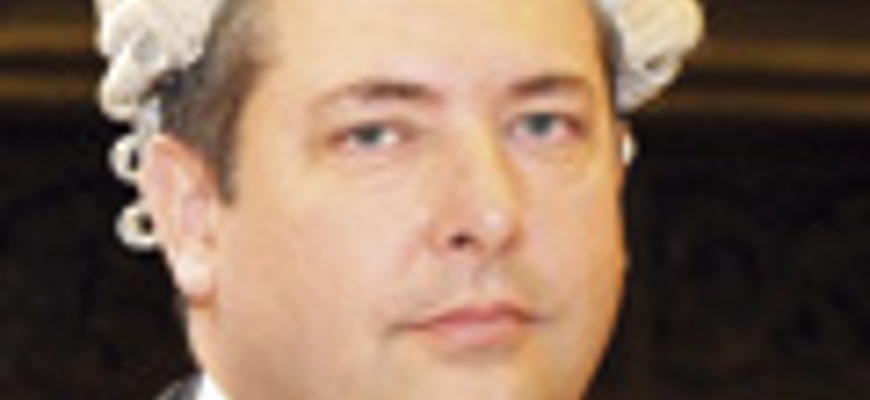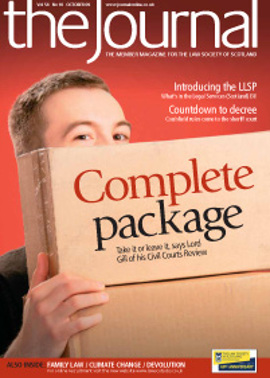Experts on the case

Has Crown Office taken a new approach to developing its investigating and prosecuting expertise? Recent months have seen almost a spate of announcements on new specialist units to deal with particular types of inquiries or prosecutions. The National Sexual Crimes Unit in March was followed over the summer by a Health & Safety Division and, most recently, the news that a specialist Deaths Unit will begin operating next spring.
Frank Mulholland QC, Solicitor General for the past two years, denies any such “Big Bang” approach. “There’s been a journey towards where we are today in specialism”,
he maintains. “When I joined the Procurator Fiscal Service in 1984 there were specialisms. We had the Crown Office High Court Unit, we also had a specialist Crown Office Appeals Unit, but they were very much smaller in size than they are today and there has been an evolution over the years towards specialisms so our capacity has been increased to deal with the more complex areas of criminal law and deaths work.”
Also in the reckoning are the Civil Recovery Unit, dealing with proceeds of crime, and the expanding International Co-operation Unit, a response to the increasing number of cases with a foreign connection. A prime example was the recent murder prosecution of Marek Harcar, which required an arrest in and evidence being obtained from his native Slovakia. Trial advocacy is also now seen in the same light, special training having been developed to refine individuals’ court skills.
Preserving expertise
That said, the emergence of specialist units to deal with particular types of crime is relatively new – and something that did not appear to be foreshadowed even in the review into how sexual offences are investigated and prosecuted, set up three years ago at the instigation of Mulholland’s predecessor, the present Lord Advocate. Its report concluded that the high degree of specialism already within COPFS was broadly equivalent to the position in those jurisdictions which claimed to employ specialist models, and further refinement would have limited impact.
Mulholland however suggests that the focus of the review was on the fiscal service and how it dealt with such cases, and once the Crown took the further step of looking at the role of Crown counsel, a principal recommendation of the subsequent review carried out by Dorothy Bain QC “was that there had to be early engagement, early involvement of Crown counsel. That’s the genesis of the National Sexual Crimes Unit”.
A wider interdisciplinary approach is likely to feature in the subject area specialisms. Mulholland himself, he admits, became a convert to the concept through the Transco prosecution following the Larkhall gas explosion. “Prior to receiving the papers and being allocated that case I really had limited involvement in health and safety matters, but in such a case which had complex issues related to health and safety it struck me that it was absolutely necessary to keep the capacity and the knowledge and experience gained, and it was unlikely that I would deal with a health and safety case of that type after Transco was completed.” As there soon followed the ICL factory explosion, the Rosepark Care Home fire and numerous other cases, “it just seemed it made sense to ensure that we retained and built on that expertise we gained as a result of dealing with those cases”.
He adds that there is more to the exercise than simply ensuring a more effective performance in court: it also results in much earlier engagement between investigators and those defending the accused, bringing earlier resolution of cases and identification of any gaps in the evidence or other problems at a much earlier stage. “We’re also seeing the benefits, or the next of kin, or the victims if injured, are seeing the benefits, if they’ve been regularly kept up to date with progress in a case, because the Health and Safety Division has a VIA involvement (Victim Information and Advice), so there’s a liaison there.”
Best method first
The trend raises the question whether the prosecution service is steadily becoming more centralised. The answer appears to be yes and no. As it happens, the Health & Safety Division has three offices (Glasgow, Edinburgh and Aberdeen) rather than one, a decision taken having regard to the historical caseload as the best means to ensure national coverage. Again, a specialist unit may develop for one location: Glasgow has a dedicated homicide unit. And whereas the smaller rural offices may still operate on the model of having a few legal staff handling most or all types of case, additional expertise is available through the current structure of area offices.
There are also benefits to be had from modern technology, Mulholland explains. “The way the IT is structured in Scotland, we essentially have online case marking called FOS, Future Office System, and one product of that is, say for example Highlands & Islands require help with a glut of cases for marking, those cases can be marked locally by procurator fiscal staff in Glasgow, and vice versa, so we’ve got that capacity within the service to help each other, and we do. So it’s not as if small offices in small jurisdictions are working in a kind of silo and what comes in they’ve got to deal with: we’re constantly looking at improving across the country what we do and we take a national approach to it.”
He adds however that whether decisions are taken locally or centrally is not the point. “What’s important is the right decision, and how that’s arrived at is knowledge of what you’re dealing with and expertise applied to what you’re dealing with, so I take the view that whether the best way to achieve the right decision is with a dedicated central expertise or with a local expertise, the best method of achieving the best decision should be applied.”
In the result
So have these specialism initiatives been producing results, especially in those sex offence cases that regularly see headlines about the low conviction rate in Scotland? “It’s fairly early days for the Sexual Crimes Unit, but they have secured convictions in a number of quite difficult cases and I think the early engagement has made a difference, it’s improved the quality of the prosecution.” At the same time, Mulholland asserts that it isn’t just about conviction rates: “To ensure justice works well you’ve got to have the best prosecution case that you can have, and the best defence that you can have presented to the jury to allow the jury to do their job and decide whether or not guilt is proved. So it’s not about securing convictions, but ensuring justice is served, that we do right by the victim, the complainer, that we present the best case we can, and that justice is better served as a result.”
Surely, given the public interest, the Crown would want to see a higher success rate? “If we believe in a case, obviously we aim for justice for the victim and justice to the accused, so if a by-product of the way we deal with that is an increased conviction rate then we welcome that, but again we’re not about securing convictions, what we are about is presenting the best prosecution that we can in a particular case, so that justice is served…. The early indications are that it’s paying dividends, with a number of cases in which we’ve received letters expressing gratitude from victims at the way it’s been dealt with.”
More to come
What can we expect to see by way of future developments? “We’re looking at other specialisms. We’re not just going to set them up for the sake of it. If there’s a need then we’ll do that.” Serious and organised crime is one possible area, with provisions in the new Criminal Justice Bill for example making it an aggravation of an offence if it is committed in furtherance of serious and organised crime, or penalising a failure to report where you have a reasonable suspicion of serious and organised crime, “so we are looking to see how we can make best use of that and how we deal with serious and organised crime. We’re also looking at environmental crime; our wildlife specialists deal with that but we’re constantly looking at whether that is the best way to deal with it. I think it would be likely there would be further specialisms in the future, but we’re not yet at a stage to announce them”.
One topic the Solicitor General mentions more than once in our discussion is community engagement, another theme where he sees expertise developing particularly at local level. “We’ve looked at how it’s done in other countries, in particular Red Hook is a district in New York and they have a community court there where the prosecutors engage with the local community so they know what their concerns are, their worries, their fears… What procurator fiscals are doing is going out and speaking to members of the community and responding to their concerns. It’s a two way process.” He instances the Glasgow domestic abuse court, and national prosecution policies regarding knife crime, as resulting from prosecutors playing their part in listening to community concerns and trying to do something about them.
What it comes down to, he emphasises, is a general ethos of the pursuit of excellence. “It’s no good looking at it from our perspective only. We’ve got to look at it from the people that we serve, the public, and I think the public interest really demands having excellence and having real expertise and specialists in particular areas of work, and I’m glad to say that we’re seeing the benefits of that.”
In this issue
- The Combined Standard Clauses (2009 edition)
- Preserving a legal inheritance: settlement rights in the "Occupied Palestinian Territories"
- The European Court and the duty to investigate deaths
- Chief Executive's SGM address
- Shelter's online resources
- Musical copyright and contract
- The international swap shop
- Headline fortnight
- The Gill Report? What's not to like?
- Solicitor advocates and conflicts of interest
- Settlement in the West Bank
- Package deal
- RoS = economic value
- Defining the future
- Global leader?
- Dog's chance
- Coulsfield rules OK
- Money and your life
- Experts on the case
- At the hub, 10 years on
- Guardians: don't look to the Fund
- From the Brussels office
- Ask Ash
- Making the most of ABS
- Planning for growth
- The perils of posting
- ARTL: friend or foe?
- Where privacy prevails
- How was it for you?
- Agreeing rescues with creditors
- Adopting new solutions
- Divorce for gender change
- Scottish Solicitors' Discipline Tribunal
- Book reviews
- Website review
- A safe pair of hands tops the bill
- Law out of step






